My Money Week is a national activity week that provides an excellent opportunity to get young people (aged 3-19) interested in financial matters and develop the skills, knowledge and confidence they need to thrive in society.
During an evaluation of My Money Week in 2022, we spoke to a primary school maths lead (and 6 of her students) who has been delivering My Money Week for many years.
Her interest in financial education stems from her experience working in two high-street banks. At one of these banks, she organised a ‘Bring a child to Work Day’, where she set up activities for the children and her colleagues. They ran a competition for children to design and market their bank cards.
In this school, My Money Week is very high profile and runs throughout the whole week. They run a whole school challenge, have a daily discussion topic, and dedicate all maths classes to My Money Week activities. They even ran a Q&A session for their year 6 students with local high school students.
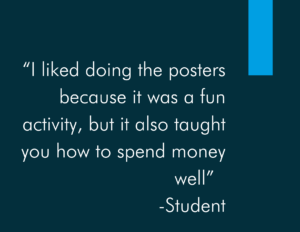
Their whole school challenge was linked to the My Money Week theme. The classes worked together to come up with a way of promoting ‘making sensible money decisions’ and ‘informing others of all the influences that can impact spending’. They were given free rein over the form that this creative challenge took, including making an app, website, comic, show or dance.
Alongside the challenge, they learnt about product placement on TV, influences on spending decisions, and peer pressure.
The lead teacher emphasised that she was keen to get companies and other people involved in their activities to bring My Money Week to life for her students. The school enlisted the support of their community champion at Morrison’s supermarket, who sponsored the challenge and judged the competition during a big assembly event.

For example, year 6 organised a party and chose all the food from the supermarket website.
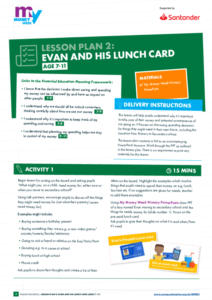
Evan and His Lunch Card – Lesson Plan (7-11) available via the resource hub.
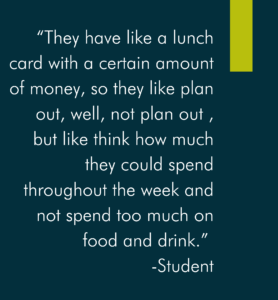 The school also invited local high school students to work with the children and answer questions from the year 6 students about what they’re about to face when they go off to high school. They discussed all the decisions they would have to make and all the outside influences they’d be facing. The children all really enjoyed this; in particular, they were interested in learning how to manage their lunch money with a lunch card and the implications of this.
The school also invited local high school students to work with the children and answer questions from the year 6 students about what they’re about to face when they go off to high school. They discussed all the decisions they would have to make and all the outside influences they’d be facing. The children all really enjoyed this; in particular, they were interested in learning how to manage their lunch money with a lunch card and the implications of this.
The lead teacher in the school supported other teachers to deliver My Money Week consistently and flexibly. Due to an Ofsted inspection, she was unable to brief them during a staff meeting that year. So instead, she made a short video to introduce the My Money Week resources, which formed the main focus of the lessons and set out expectations of what she expected class teachers to cover. This ensured all teachers knew what was expected of them regardless of their experience delivering My Money Week.
The lead teacher talked about how motivated the children were and how much they enjoyed the activities. Due to her prior career in banking, the lead teacher was already confident delivering My Money Week but noted that it’s not really beyond anyone and that the My Money Week resources provide teachers with a toolkit to deliver financial education in a way that the children understand.
Likewise, children talked enthusiastically about what they had learnt from participating in MMW, particularly how to be a more critical consumer. See a range of quotes from the students below:
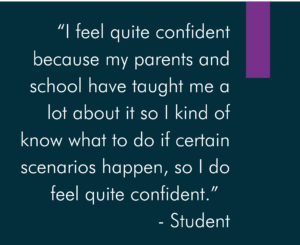
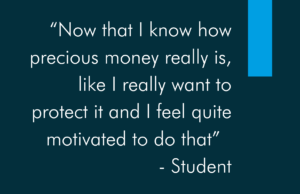
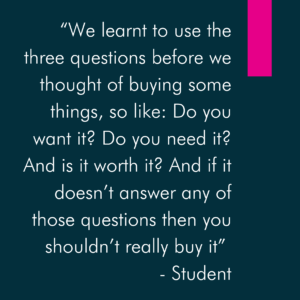
The children involved in My Money Week were keen to retake part and learn different things, in particular, “how much you get paid for certain jobs” and “how much things cost in reality”, such as “heating and stuff, like water and electricity.”
The teacher reflected on how it “would be good to have a theme about the environment” that helps young people understand “how you can spend money and help the world” and make wise spending decisions that benefit the environment.
One student noted that “green type of things are actually more expensive than not green things.” Another, explained the rationale for a purchase she had made: “I bought this leather and sugar paper sort of notebook, and it was like £18, and apparently it helps this family in India for like a month, so like I was thinking, yeah, I really want to buy it because it’s good for me and it’s really good for that family in India.”
This year’s My Money Week theme is saving money and protecting the planet. Students will explore how to reduce waste and care for what they have. They will consider how their spending and saving decisions impact the planet, their financial well-being, and others around the globe. Register for the My Money Week hub to access new resources when they are shared at the start of the summer term.
